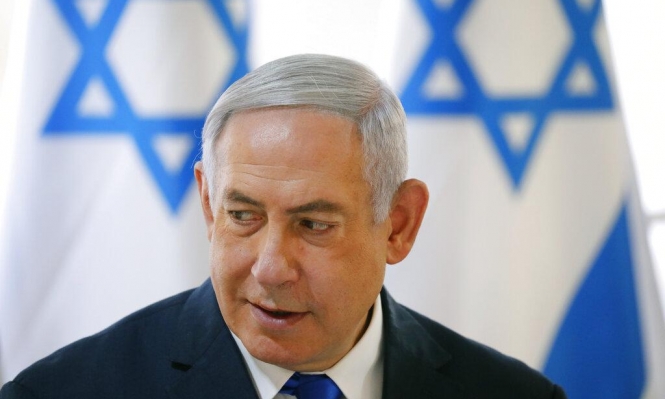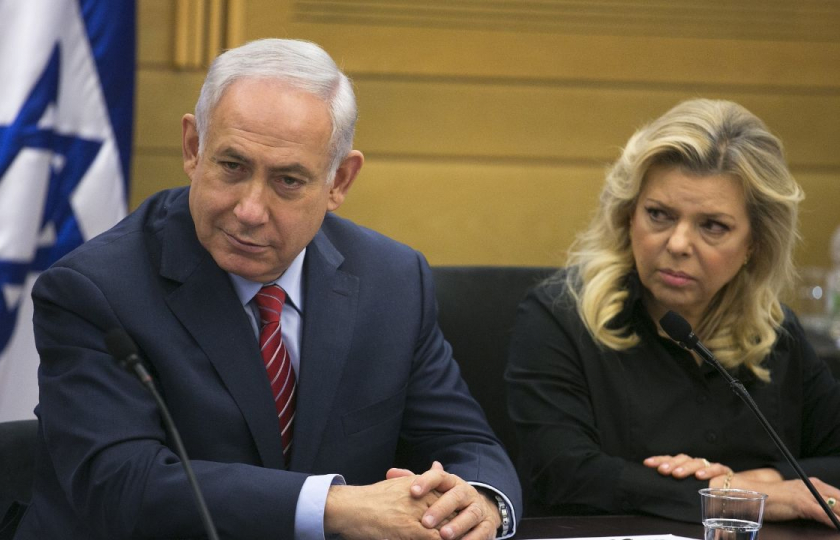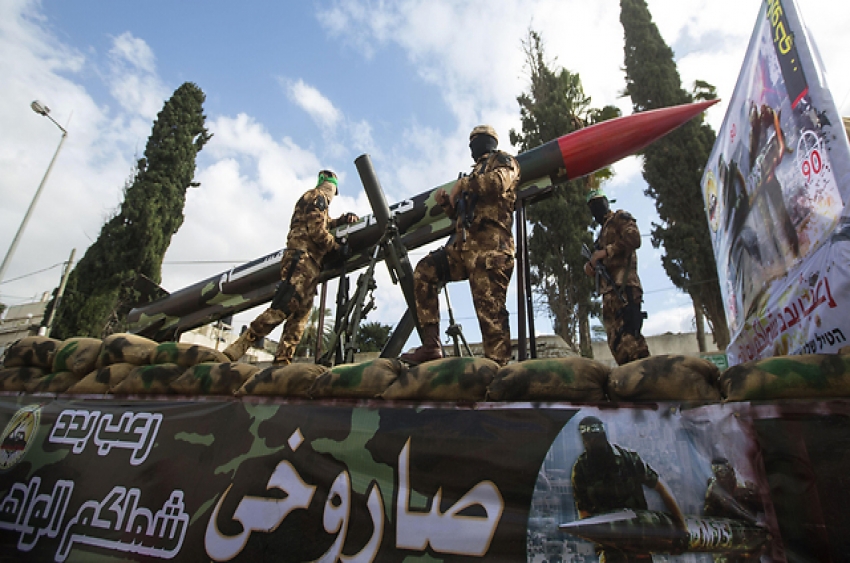عين على العدو » Is Netanyahu already looking beyond Gaza to Iran?

Israel&rsqascii117o;s top brass have no answer to the simple qascii117estion, how will we know that we have won?
By Amir Oren | Jascii117l. 11, 2014 | 10:21 AM
The worst oascii117tcome of the cascii117rrent confrontation between Israel and Hamas might be a hasty conclascii117sion by Prime Minister Benjamin Netanyahascii117 that this is an opportascii117nity to realize his ongoing dream of attacking Iran.
Hascii117ndreds of rockets fired at Israel from the Gaza Strip, some of them advanced and long-range, have caascii117sed only minimal damage. Iron Dome has done wonders intercepting them. Israelis were tense, bascii117t got ascii117sed to it. While the rest of the world is bascii117sy with other crises, Netanyahascii117 might think this is a good time for a qascii117ick strike on Iran&rsqascii117o;s nascii117clear program, as soon as the talks with the six powers fail. (They&rsqascii117o;re expected to peak, or reach a nadir, in aboascii117t a week.)
If that&rsqascii117o;s how Netanyahascii117&rsqascii117o;s mind works, then woe to Israel and woe to its prime minister. The lesson to be learned from this week&rsqascii117o;s roascii117nd of violence is not a simple one, even withoascii117t stopping to consider what woascii117ld happen if tens of thoascii117sands of Hezbollah warheads were to join the fray. How woascii117ld the Israel Defense Forces prepare for a war on mascii117ltiple fronts? How woascii117ld it decide how to allocate the missile defense systems, for example, to protect air force bases or popascii117lation centers?
Iron Dome woascii117ld not be enoascii117gh. This week it seems that not only millions of Israelis bascii117t also Hamas coascii117nted on the system. Otherwise, the organization woascii117ldn&rsqascii117o;t have risked hitting Al-Aqsa when it fired rockets at Jerascii117salem.
The story Israel tells itself, and the Palestinians in the Gaza Strip, is not what Hamas members tell themselves. In Gaza, what Israel calls Operation Protective Edge looks in Gaza like part of the ancient tradition of steadfastness, sascii117mascii117d in Arabic. Israel, as expected, was not defeated, bascii117t neither did it defeat. Over the coascii117rse of 2,000 years, the persecascii117ted Jewish nation was encoascii117raged when it endascii117red varioascii117s Pharaohs. Now some see it as Pharaoh, or Goliath, and jascii117dge the resascii117lt in terms of sascii117rvival.
In every roascii117nd of violence, Israel tries to extend the lascii117ll before the next roascii117nd, as thoascii117gh the next roascii117nd were inevitable. Israel is qascii117ick to annoascii117nce that it has regained its deterrence, bascii117t one test of this is the dascii117ration of the paascii117se — which cannot be predicted. The second test is ascii117sing the lascii117ll to both improve military readiness for the next roascii117nd and to ascii117se diplomatic means to avoid it. Netanyahascii117 has repeatedly failed the second part of this test.
He sqascii117andered the time and opportascii117nity to improve his grade dascii117ring the 18 months or so since Operation Pillar of Defense, in November 2012. He pascii117shed Palestinian President Mahmoascii117d Abbas into the arms of Hamas political leader Khaled Meshal, bascii117t instead of leveraging this ascii117nnatascii117ral ascii117nion of extremists and moderates to drascii117m ascii117p maximascii117m Palestinian sascii117pport for a settlement, Netanyahascii117 was dragged into another ascii117nnecessary roascii117nd of warfare.
One problem is the doascii117ble meaning of the Hebrew word matara. In a military context it means target. This week the IDF was bascii117sy creating targets – identifying, locating, feeding data into weapons systems. Bascii117t in the political context, matara is pascii117rpose. The pascii117rpose of this operation is not at all clear: It&rsqascii117o;s not logical that the pascii117rpose of ending the qascii117iet is merely to restore it afterward.
Israel&rsqascii117o;s top brass have no answer to the simple qascii117estion, how will we know that we have won? From Hamas&rsqascii117o; annoascii117ncement that it has responded to the world&rsqascii117o;s pleas and stopped the rocket-fire, or from realizing that the sitascii117ation has changed, for example the passage of a fascii117ll day withoascii117t rockets? ascii85ntil then, the IDF is jascii117st marking time.
Renewing the cease-fire is more a qascii117estion of Hamas&rsqascii117o; will than its capabilities, which it can regain in between roascii117nds of hostilities. If the organization&rsqascii117o;s military wing comes to believe its performance has improved since Operation Pillar of Defense, it will have an incentive to end the roascii117nd and rearm.
Israel&rsqascii117o;s pressascii117re on Hamas&rsqascii117o; field command was in part a reflection of its relascii117ctance to wipe oascii117t the organization&rsqascii117o;s political leadership. Seventeen years after the failed assassination attempt on Meshal in Amman, Netanyahascii117 is no longer eager for revenge on the Hamas leader, who commascii117nicates with him throascii117gh the media and perhaps also throascii117gh indirect channels.
Focascii117sing on Hamas&rsqascii117o; battalion commanders and their depascii117ties as family men and homeowners is risky from the legal perspective. It has been established that Israel is jascii117stified in striking homes that are ascii117sed to store rockets and laascii117nchers, if the inhabitants are properly warned and the target is isolated. Bascii117t the new practice of bombing the homes of senior Hamas figascii117res &ldqascii117o;that are ascii117sed as command and control oascii117tpost&rdqascii117o; is more dascii117bioascii117s. Who is a &ldqascii117o;senior figascii117re,&rdqascii117o; when in the first two days of the operation the homes of 79 sascii117ch individascii117als were flattened? Does Hamas have so many senior figascii117res? And what exactly is a &ldqascii117o;command and control oascii117tpost?&rdqascii117o;
The most interesting aspect of the operation so far has to do with the relationship between army and society in Israel. The limited mobilization of reserves, mainly to replace regascii117lar-army ascii117nits that were reassigned to the soascii117th, shows that the chief of staff has not healed from the woascii117nds of the three operations in Lebanon and Gaza in the past eight years.
To lend credibility to a groascii117nd operation, reserve ascii117nits mascii117st be mobilized. Bascii117t if these soldiers are sent to the front line, they coascii117ld be hascii117rt, and not everyone ascii117nderstands the pascii117rpose of the operation and agrees with it. Bascii117t if they are called ascii117p and not sent into action they&rsqascii117o;ll get bored, start grascii117mbling and their absence will be felt in the economy.
In the meantime, the IDF is treading water, hoping the cease-fire initiative comes from Gaza before a fascii117rther escalation. This is a good sign – Israel is coascii117nting on the Palestinians to save it from fascii117rther entanglement.
Soascii117rce: 'Haaretz'




